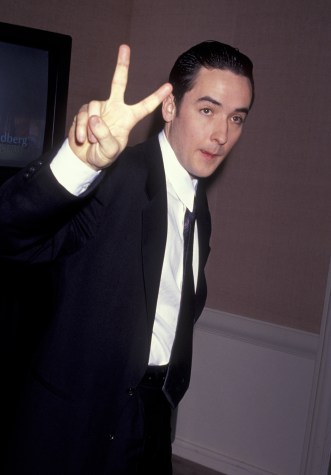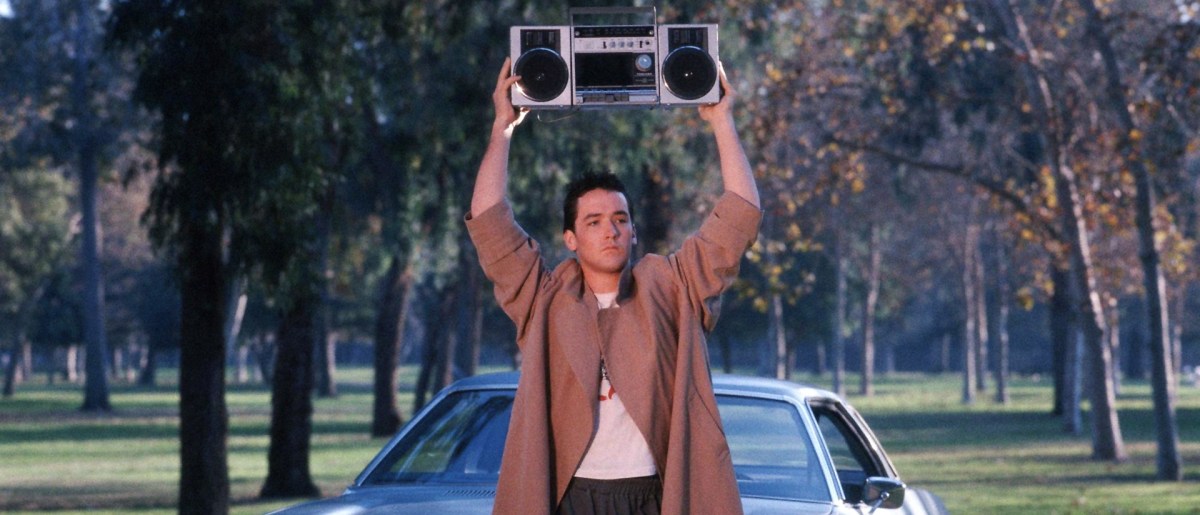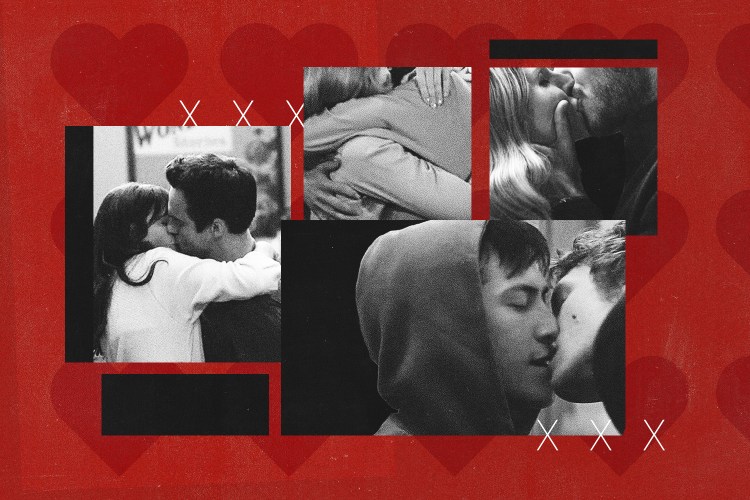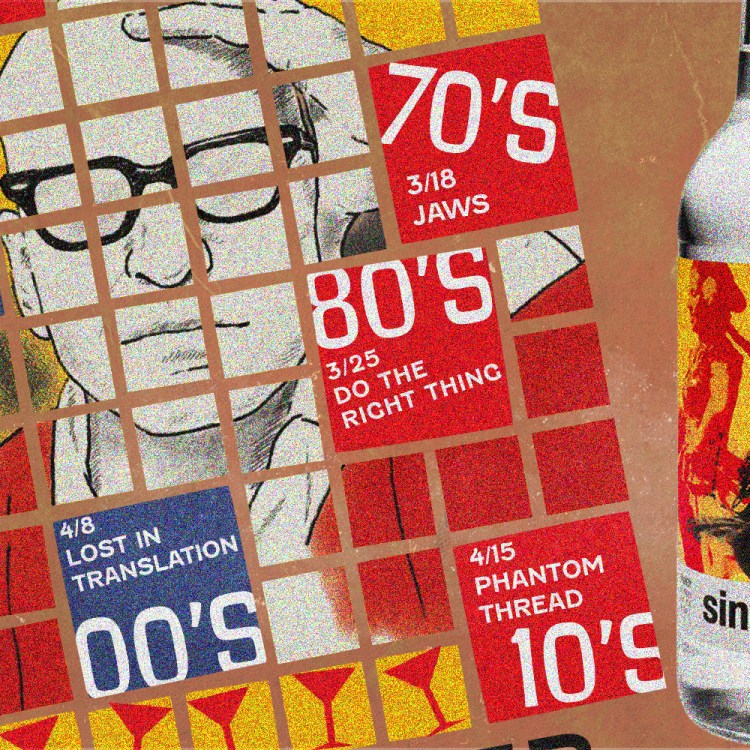There’s a story Cameron Crowe likes to tell about an encounter in a bar shortly after his directorial debut, 1989’s Say Anything… had hit theaters. He was out with his leading man, John Cusack, when a woman approached and asked the actor, “Aren’t you Lloyd Dobler?”
“Well, yeah,” Cusack, then just 23-years-old, replied. “On my better days, I am Lloyd Dobler.”
It’s a great, revealing line — one that speaks to the nature of celebrity in a way Crowe liked so much that he paraphrased it 11 years later in Almost Famous — but it also rings true in a way that’s unique to Cusack. Thirty years after Say Anything…, Lloyd Dobler remains aspirational: the quintessential supportive boyfriend, an idealist who refuses to compromise his beliefs, an all-around great guy beloved by anyone who knows him. He represents the best of all of us, but more literally, he embodies the best of John Cusack; the breakout role established him as an everyman with a touch of mystique, kicking off a decade or so of strong performances that each feature traces of Lloyd.
Say Anything… goes out of its way to remind us that Lloyd is an extremely regular guy. He’s an aimless teen. He drives a Chevy Malibu. He’s got what his friend Corey (played by Lili Taylor) calls “that nervous talking thing.” He’s attractive, but he has a tendency to wear the sweatpants he kickboxes in out in public when he’s not kickboxing. Just about every character in the movie is initially stunned to see him with Diane Court, the valedictorian; and when he initially asks her out, she has no idea who he is, despite going to school with him for four years and sitting across from him once in a mall food court. When they finally go on a date, she gleefully tells him, “I’ve never really gone out with someone as basic as you.”
And yet there’s plenty about Lloyd that’s extraordinary and ahead of its time. He is wholly devoted to Diane, not at all intimidated by her success and willing to put his own life on hold and tag along with her to England for her fellowship. When they briefly break up, he wonders if it’s because he’s been relying too much on the women in his life and seeks the advice of a bunch of bros hanging out at a gas station. After the typical stupid teenage, “bitches, man!” response, Lloyd immediately realizes his mistake, asking, “If you guys know so much about women, how come you’re here at, like, the Gas ‘N Sip on a Saturday night completely alone, drinking beers with no women anywhere?” That basic human decency has helped him stand the test of time while other ‘80s teen heartthrobs like Sixteen Candles’ Jake Ryan — who passes off his black-out drunk and clearly incapacitated girlfriend to a stranger in exchange for another girl’s panties, telling him, “I could violate her 10 different ways if I wanted to” — demand reconsideration in 2019.
Unlike his contemporaries, there’s nothing problematic about Lloyd. He obsesses over and dotes on Diane in a way we rarely see men do in movies. (When they have sex for the first time, for example, he’s the one who gets emotional about it, to a point where he’s so overcome he starts shaking.) She is his whole world; he is a Manic Pixie Dream Boy who was winning the hearts of moviegoers by hoisting that boombox and blasting Peter Gabriel’s “In Your Eyes” decades before that term even existed. Lloyd’s romanticism helped make John Cusack a star, and it’s part of what solidified him as what some have called “the thinking woman’s sex symbol.”

Even when you strip away the grand gestures, Lloyd Dobler and John Cusack seem to have a lot in common. They share that everyman appeal, but there’s an undeniable coolness mixed in there as well; like if Tom Hanks or Jimmy Stewart were really into The Clash. They both kickbox — Cusack kept at it after the movie, training under world kickboxing champion Benny Urquidez for decades. And of course, both Dobler and Cusack share a cynicism or a distaste for phoniness and greed, with Lloyd declaring in Say Anything…,“I don’t want to sell anything, buy anything or process anything as a career. I don’t want to sell anything bought or processed, or buy anything sold or processed, or process anything sold, bought or processed, or repair anything sold, bought or processed,” and Cusack choosing to make his home in his native Chicago instead of LA (he once called Hollywood a “whorehouse” where “people go mad”). When he does spend time out west, it’s not exactly the glitz and glamour one might expect; instead he spends his time as a member of the Malibu Mob, palling around and taking in hockey games with the likes of Chicago Blackhawks and Detroit Red Wings legend Chris Chelios and fellow everyman Ed O’Neill.
Perhaps that refusal to become a cog in the Hollywood machine is why Cusack didn’t allow himself to be typecast in rom-coms in the years following Say Anything… Though he’d revisit the genre in later years with Serendipity, Must Love Dogs and America’s Sweethearts (itself an indictment of self-absorbed actors), most of his post-Dobler years saw him instead opting for a bunch of morally ambiguous characters that, on their surface at least, seem to have little in common with Lloyd: a con man (The Grifters), an adulterous playwright who gets mixed up with the mob (Bullets Over Broadway), a hit man (Grosse Pointe Blank), a depressed puppeteer who uses a portal inside the mind of John Malkovich for his own personal gain (Being John Malkovich) and an emotionally stunted record store owner who puts his girlfriend through hell (High Fidelity).
But there are touches of Lloyd Dobler in nearly all of those roles, whether it’s his charm or his nervous energy or his refusal to sell out (something Cusack’s David Shayne must come to terms with in Bullets Over Broadway, at one point screaming, “I’M A WHORE” out an open window). For all its darkness, Grosse Pointe Blank, which Cusack co-wrote, is a romantic comedy at heart, telling the story of a hitman who wants to ditch the murder business and settle down with a girl years before HBO’s Barry offered its twist on the formula. (Plus it features not one but two Clash songs and a score by Joe Strummer of which Lloyd would certainly approve.) Martin Blank is a killer, but being an assassin is something he just sort of stumbled into after his time in the army; in a weird way he’s a glimpse of Lloyd in an alternate timeline, one where the aimless kid followed in his dad’s footsteps and enlisted instead of deciding he “could never work for that corporation.” He’s still a regular guy with a secretary who attends his high school reunion and pines over the one that got away, and like Lloyd, he sees the object of his affection as the answer to everything, his ticket out of a life he’s itching to escape.
That Cusack mystique is what makes High Fidelity‘s Rob Gordon another Dark Lloyd. We root for him to get it together because he’s cool and charming and passionate, but he’s another example of what might have become of Lloyd had he listened to those guys at the Gas ‘N Sip. He’s the Lloyd we see flashes of after Diane breaks his heart, riding around in a downpour and reveling in his own misery, saying things like “The rain on my car is a baptism, the new me, Ice Man, Power Lloyd. My assault on the world begins now” into a tape recorder. It’s not hard to see how that guy would be standing outside a window yelling “Charlie, you fucking bitch! Let’s work it out!” a few years later. Rob is a classic fuckboy, a manic pixie nightmare of a boyfriend who in no way deserves to reconcile with Laura, but we want him to anyway because even Power Lloyd is deeply relatable. By the end of the movie, he’s seen the error of his ways, realizing he’s been an asshole; he gets his answers from Laura as she pushes him to try his hand at producing, and the last time we see him, he’s working on a gesture Lloyd would be proud of: making a mixtape for her, “full of stuff she likes. Full of stuff that would make her happy” because “for the first time I can sort of see how that’s done.”
He’s not living in the shadow of Lloyd Dobler by any means, but Cusack’s career is proof that no one’s irredeemable, that even the most heinous characters have the potential for greatness. There’s a little Lloyd in all of us, and he’s ready to show up with that boombox on our better days.
This article appeared in an InsideHook newsletter. Sign up for free to get more on travel, wellness, style, drinking, and culture.

























